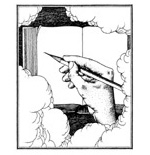
The Next Forty
EDITORIAL
This month we conclude our commemoration of the New Oxford Review’s 40th year of continuous publication. In celebration of this milestone, in each issue this year we have reproduced an article from our archives. We kicked things off with “A Protestant Considers the Catholic Magisterium” (Jan.-Feb.) by David Hartman, which originally appeared in September 1989. In each issue thereafter, we featured the following:
– “Turning Catholics into a Stiff-Kneed People” (March; orig. Jul.-Aug 1999) by J.A. Gray
– “The Soul of Man Under Secularism” (April; orig. Jul.-Aug. 1991) by Christopher Lasch
– “‘No Enemies to the Left’ — Still!” (May; orig. Jul.-Aug. 2001) by Kenneth D. Whitehead
– “The Politics of Abandonment” (June; orig. Jan.-Feb. 1988) by L. Brent Bozell
– “Why Was Christ a Male & Why Did He Ordain Only Men?” (Jul.-Aug.; orig. Jan.-Feb. 1996) by Raymond T. Gawronski, S.J.
– “The Bishops’ Pastoral on the Economy & the Scandal of Catholicism” (Sept.; orig. Jan.-Feb. 1987) by Dale Vree
– “A Letter from a Concerned Episcopalian” (Oct.; orig. Oct. 2003) by Fr. Edward B. Connolly
– “The Truth About the Homosexual Rights Movement” (Nov.; orig. Feb. 2006) by Ronald G. Lee
In this issue, we offer a special treat: “A Trialogue with C.S. Lewis, Martin Luther & Thomas Aquinas” (orig. Jul.-Aug. 1994) by the incomparable Peter Kreeft. Like all classic Kreeft, this trialogue is at once imaginative, instructive, and entertaining. It retains a certain timelessness, though its re-appearance is particularly timely: Not only is 2017 the NOR’s 40th anniversary, it is also the 500th anniversary of the Protestant Reformation. This article is, we think, a fitting finale to our retrospective.
You May Also Enjoy
Just about everyone, from Right to Left, agrees that over the last eight months we’ve…
We have a society of many willing workaholics with low civic participation, families falling apart, unsupervised children, and lonely old people.
Moving Beyond the 'Yellow Armadillo'... Classical Education in Southern California... A Loss of Nerve?

